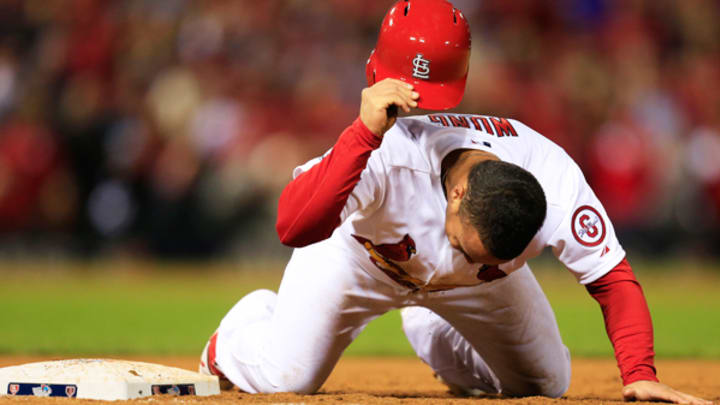How Do Most World Series Games End? A Statistical Breakdown of Every Final Play

Dilip Vishwanat/Getty Images

On back-to-back nights, a World Series game ended as none had ever ended before. In Game 3 it was an obstruction call, and in Game 4 it was a runner getting picked off first base by the pitcher. Seeing consecutive games end on such aberrations made us wonder: How do most World Series games end? So I checked.
According to my counting skills—and if Baseball-Reference is to be trusted—there have been 633 World Series games since the inception of the Fall Classic in 1903. Here's how the final plays went:
30%
ended with a ground out

In 2004, when the Red Sox clinched their first title in 86 years, it was on an Edgar Renteria ground out to pitcher Keith Foulke in Game 4.
24% ended with a fly out
Game 7 of the 2011 World Series ended with Rangers outfielder David Murphy depositing a ball into the glove of Cardinals left fielder Allen Craig.
20% ended with a strikeout
Don Larsen wrapped up his Game 5 perfect-o with a punch-out in 1956. And though you may have already forgotten, Games 1 and 2 of this year's series ended with a K, as well.
7% ended with a pop fly
The six-game 1977 World Series ended when Dodgers pinch hitter Lee Lacy hit a pop fly while bunting. You never want to go out on a bunt.
5% ended with a double play involving a grounder or line drive
4% ended with a single
4% ended with a line out
It happened most recently in Game 2 of the 2001 World Series, when Derek Jeter roped a 1-1 pitch from Randy Johnson at Diamondbacks second baseman Craig Counsell.
2% ended with a walk-off home run
The last time we saw it happen was in 2011, when Cardinals third baseman David Freese hit a blast to center field that pushed the series against the Rangers to a Game 7.
5 games ended with a double
No games, it's worth noting, have ever ended on a triple.
4 games ended with a caught stealing
One of those four was a strike-em-out, throw-em-out double play. Another involved Babe Ruth, who was famously caught stealing in Game 7 of the 1926 World Series.

3 games ended with a sacrifice fly
Game 6 of the 1971 Series went into a 10th frame before Orioles third baseman Brooks Robinson hit a fly to center that allowed right fielder Frank Robinson to make it home.
3 games ended with a walk-off error
You might recall Game 6 of the 1986 Series, when Bill Buckner let a grounder roll through his legs.

1 game ended with a runner tagged out during a run-down
In 1918, the Red Sox won Game 3 against the Cubs after Chicago pinch hitter Turner Barber got caught in a rundown between third base and home following a passed ball.
1 game ended with a runner scoring on a wild pitch
In 1927, the Murderers Row of New York completed their sweep of the Pirates in dramatic fashion when center fielder Earle Combs scored on a wild pitch.

Then came Games 3 and 4 of this series.
There was only about a 1% chance going into Game 3 that we'd witness an ending that wasn't a ground out, pop fly, line out, strikeout, fly out, single, double, home run, or sacrifice fly. And then, miraculously, we witnessed back-to-back games with an pioneering final out. To call it unlikely would be a massive understatement.
Now there's at most two games remaining in this series. In what other ways could they end that would be unprecedented in World Series history? Well …
- Carlos Beltran hits a game-winning walk-off grand slam.
- Jacoby Ellsbury, standing at third base, takes off when Trevor Rosenthal checks on Dustin Pedroia at first, making Ellsbury the first player to win a game with a steal of home.
- Johnny Gomes throws out Matt Holliday at home as he tries to score.
- Jarrod Saltalamacchia grounds into a game-losing triple-play. (This a distinct possibility.)
- David Freese collects another game-winning RBI, this time on a walk-off walk.
- Jake Peavy plunks Matt Adams in his substantial thigh with the bases loaded.
- Allen Craig hits what looks to be a game-tying home run, only to be ejected and called out after he kicks, with his bum foot, each of the Boston infielders in the groin as he circles the bases.
- Jacoby Ellsbury and Shane Victorino slam into each other as they chase down a ball, allowing the ball to get all the way to the wall and for Kolten Wong to score on an inside-the-park home run.
- The St. Louis Cardinals collectively realize the emptiness of sports and forfeit in the 4th inning.
- Pete Kozma lays down a bunt—and at that precise moment, a small tornado appears and carries the ball out into the left field bleachers for the first bunt home run in baseball history.
